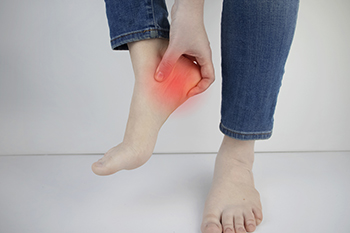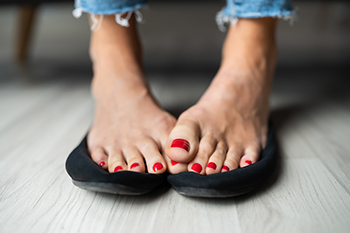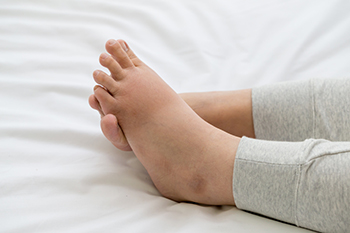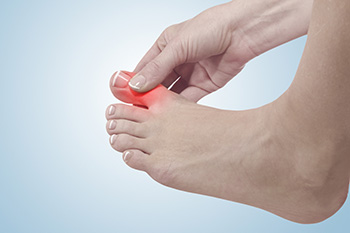Connect With Us
Blog
Items filtered by date: April 2022
Treatment Options for Sweaty Feet
People who have feet that sweat excessively may have a condition that is known as plantar hyperhidrosis. It may be the result of a neurological or endocrine disorder and can be quite uncomfortable. There are several treatment options, and this can depend on the severity of this ailment. Surgery may be a viable option for successfully removing the sweat glands. Patients who are afflicted with this condition often keep an extra pair of shoes and socks close by. It can be professionally and socially disabling, and many patients who have this condition are often embarrassed. If you think you may have hyperhidrosis, it is suggested that you schedule an appointment with a podiatrist who can offer you the correct treatment solutions.
If you are suffering from hyperhidrosis contact Vivian C. Iwu, DPM of Choice Podiatry Center. Our doctor can provide the care you need to attend to all of your foot and ankle needs.
Hyperhidrosis of the Feet
Hyperhidrosis is a rare disorder that can cause people to have excessive sweating of their feet. This can usually occur all on its own without rigorous activity involved. People who suffer from hyperhidrosis may also experience sweaty palms.
Although it is said that sweating is a healthy process meant to cool down the body temperature and to maintain a proper internal temperature, hyperhidrosis may prove to be a huge hindrance on a person’s everyday life.
Plantar hyperhidrosis is considered to be the main form of hyperhidrosis. Secondary hyperhidrosis can refer to sweating that occurs in areas other than the feet or hands and armpits. Often this may be a sign of it being related to another medical condition such as menopause, hyperthyroidism and even Parkinson’s disease.
In order to alleviate this condition, it is important to see your doctor so that they may prescribe the necessary medications so that you can begin to live a normal life again. If this is left untreated, it is said that it will persist throughout an individual’s life.
A last resort approach would be surgery, but it is best to speak with your doctor to find out what may be the best treatment for you.
If you have any questions please feel free to contact our office located in Marietta, GA . We offer the newest diagnostic and treatment technologies for all your foot and ankle needs.
Why Live with Pain and Numbness in Your Feet?
What Can I Do About Swelling in My Feet and Ankles?
Swelling in the feet and ankles (edema) is caused by fluid that builds up in these areas. It is often the result of standing or walking for too long, having too much salt in your diet, being overweight, or being pregnant. Several medications, such as steroids, blood pressure meds, contraceptives, and antidepressants, may also cause swelling in the extremities. Other causes include blood clots, kidney or liver problems, bee sting or insect bite, or infection. Symptoms of edema are shiny, red, or stretched skin and puffy feet, ankles, and lower legs. Ways to reduce the swelling include keeping your foot elevated when sitting or lying down, doing simple exercises to encourage blood flow, and wearing wide, comfortable shoes with a low heel and soft sole. If you have frequent bouts of edema, or if the swelling does not recede after a few days, it’s a good idea to check in with a podiatrist for an examination and recommended treatment options.
Everyday foot care is very important to prevent infection and other foot ailments. If you need your feet checked, contact Vivian C. Iwu, DPM from Choice Podiatry Center. Our doctor can provide the care you need to keep you pain-free and on your feet.
Everyday Foot Care
Often, people take care of their bodies, face and hair more so than they do for their feet. But the feet are a very important aspect of our bodies, and one that we should pay more attention to. Without our feet, we would not be able to perform most daily tasks.
It is best to check your feet regularly to make sure there are no new bruises or cuts that you may not have noticed before. For dry feet, moisturizer can easily be a remedy and can be applied as often as necessary to the affected areas. Wearing shoes that fit well can also help you maintain good foot health, as well as making it easier to walk and do daily activities without the stress or pain of ill-fitting shoes, high heels, or even flip flops. Wearing clean socks with closed shoes is important to ensure that sweat and bacteria do not accumulate within the shoe. Clean socks help to prevent Athlete’s foot, fungi problems, bad odors, and can absorb sweat.
If you have any questions please feel free to contact our office located in Marietta, GA . We offer the newest diagnostic and treatment technologies for all your foot and ankle needs.
Gout May Not Be the Only Arthritis Affecting Your Joints
Gout is a painful arthritic condition caused by an excessive amount of uric acid in the body that hardens into crystals that lodge in the joints. Gout can occur in any joint, however, it is most common in the metatarsophalangeal, or MTP, joint at the base of the big toe. People with gout may also have other forms of arthritis, such as osteoarthritis (OA), rheumatoid arthritis (RA), and psoriatic arthritis (PsA)—particularly because they all share obesity as a risk factor. In addition, the degenerative effects OA has on joints, and the faster skin cell turnover cycle in PsA can make a person more susceptible to developing gout. If you have any pain in your MTP joint, or any joint in your feet or ankles, a podiatrist can examine you and make a proper diagnosis with a CT scan and/or joint (synovial) fluid analysis. Once your podiatrist determines the presence of gout or any other form of arthritis, they can treat you accordingly.
Gout is a painful condition that can be treated. If you are seeking treatment, contact Vivian C. Iwu, DPM from Choice Podiatry Center. Our doctor will treat your foot and ankle needs.
What Is Gout?
Gout is a form of arthritis that is characterized by sudden, severe attacks of pain, redness, and tenderness in the joints. The condition usually affects the joint at the base of the big toe. A gout attack can occur at any random time, such as the middle of the night while you are asleep.
Symptoms
- Intense Joint Pain - Usually around the large joint of your big toe, and it most severe within the first four to twelve hours
- Lingering Discomfort - Joint discomfort may last from a few days to a few weeks
- Inflammation and Redness -Affected joints may become swollen, tender, warm and red
- Limited Range of Motion - May experience a decrease in joint mobility
Risk Factors
- Genetics - If family members have gout, you’re more likely to have it
- Medications - Diuretic medications can raise uric acid levels
- Gender/Age - Gout is more common in men until the age of 60. It is believed that estrogen protects women until that point
- Diet - Eating red meat and shellfish increases your risk
- Alcohol - Having more than two alcoholic drinks per day increases your risk
- Obesity - Obese people are at a higher risk for gout
Prior to visiting your podiatrist to receive treatment for gout, there are a few things you should do beforehand. If you have gout you should write down your symptoms--including when they started and how often you experience them, important medical information you may have, and any questions you may have. Writing down these three things will help your podiatrist in assessing your specific situation so that he or she may provide the best route of treatment for you.
If you have any questions, please feel free to contact our office located in Marietta, GA . We offer the newest diagnostic and treatment technologies for all your foot care needs.
What Happens When You Have Plantar Fasciitis?
 Plantar fasciitis is a painful heel condition that affects the plantar fascia (which is the fibrous band of tissue connecting the bottom of the foot to the heel bone and metatarsals at the ball of the foot). The plantar fascia helps maintain the arch of the foot, foot stability, and movement. Repeated stretching and contracting can result in micro-tears and/or inflammation of the plantar fascia. If the plantar fascia ruptures, the arch of the foot collapses and the foot flattens. People who suffer from plantar fasciitis often feel heel pain when getting out of bed or after prolonged sitting because the plantar fascia goes from a relaxed shortened state to a weighted, forced stretch. Those at greater risk for plantar fasciitis are those with flat feet, excessive foot pronation or feet that roll inward, high arches, weak plantar flexor muscles, those who run, and those who stand or walk for prolonged periods of time without sufficient rest and renewal. Because other types of heel pain may be misdiagnosed as plantar fasciitis, and untreated heel pain can worsen and interfere with daily functioning, if pain persists, a visit to a podiatrist is the best course of action for proper diagnosis and treatment.
Plantar fasciitis is a painful heel condition that affects the plantar fascia (which is the fibrous band of tissue connecting the bottom of the foot to the heel bone and metatarsals at the ball of the foot). The plantar fascia helps maintain the arch of the foot, foot stability, and movement. Repeated stretching and contracting can result in micro-tears and/or inflammation of the plantar fascia. If the plantar fascia ruptures, the arch of the foot collapses and the foot flattens. People who suffer from plantar fasciitis often feel heel pain when getting out of bed or after prolonged sitting because the plantar fascia goes from a relaxed shortened state to a weighted, forced stretch. Those at greater risk for plantar fasciitis are those with flat feet, excessive foot pronation or feet that roll inward, high arches, weak plantar flexor muscles, those who run, and those who stand or walk for prolonged periods of time without sufficient rest and renewal. Because other types of heel pain may be misdiagnosed as plantar fasciitis, and untreated heel pain can worsen and interfere with daily functioning, if pain persists, a visit to a podiatrist is the best course of action for proper diagnosis and treatment.
Plantar fasciitis is a common foot condition that is often caused by a strain injury. If you are experiencing heel pain or symptoms of plantar fasciitis, contact Vivian C. Iwu, DPM from Choice Podiatry Center. Our doctor can provide the care you need to keep you pain-free and on your feet.
What Is Plantar Fasciitis?
Plantar fasciitis is one of the most common causes of heel pain. The plantar fascia is a ligament that connects your heel to the front of your foot. When this ligament becomes inflamed, plantar fasciitis is the result. If you have plantar fasciitis you will have a stabbing pain that usually occurs with your first steps in the morning. As the day progresses and you walk around more, this pain will start to disappear, but it will return after long periods of standing or sitting.
What Causes Plantar Fasciitis?
- Excessive running
- Having high arches in your feet
- Other foot issues such as flat feet
- Pregnancy (due to the sudden weight gain)
- Being on your feet very often
There are some risk factors that may make you more likely to develop plantar fasciitis compared to others. The condition most commonly affects adults between the ages of 40 and 60. It also tends to affect people who are obese because the extra pounds result in extra stress being placed on the plantar fascia.
Prevention
- Take good care of your feet – Wear shoes that have good arch support and heel cushioning.
- Maintain a healthy weight
- If you are a runner, alternate running with other sports that won’t cause heel pain
There are a variety of treatment options available for plantar fasciitis along with the pain that accompanies it. Additionally, physical therapy is a very important component in the treatment process. It is important that you meet with your podiatrist to determine which treatment option is best for you.
If you have any questions, please feel free to contact our office located in Marietta, GA . We offer the newest diagnostic and treatment technologies for all your foot care needs.





